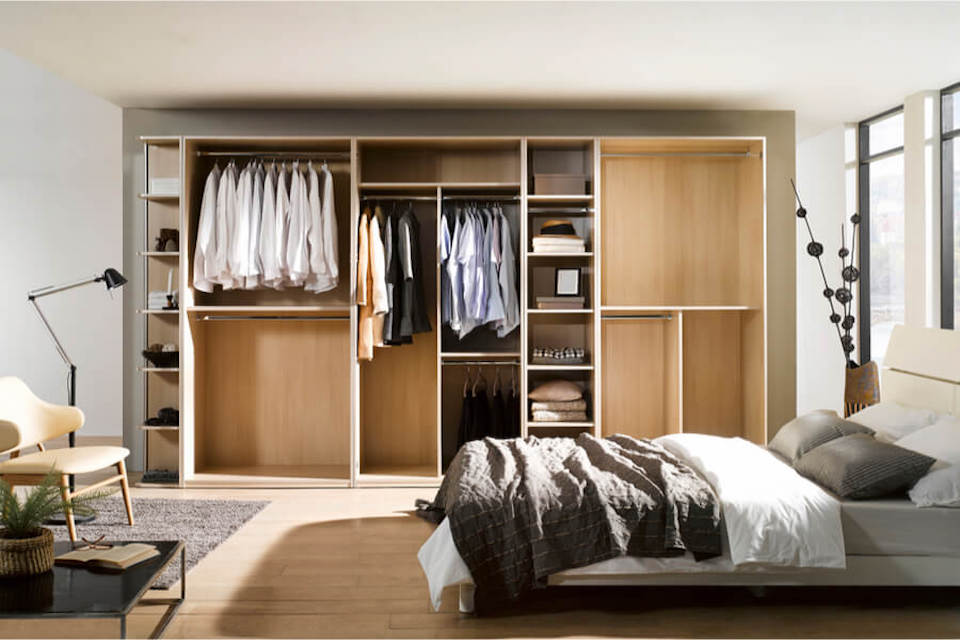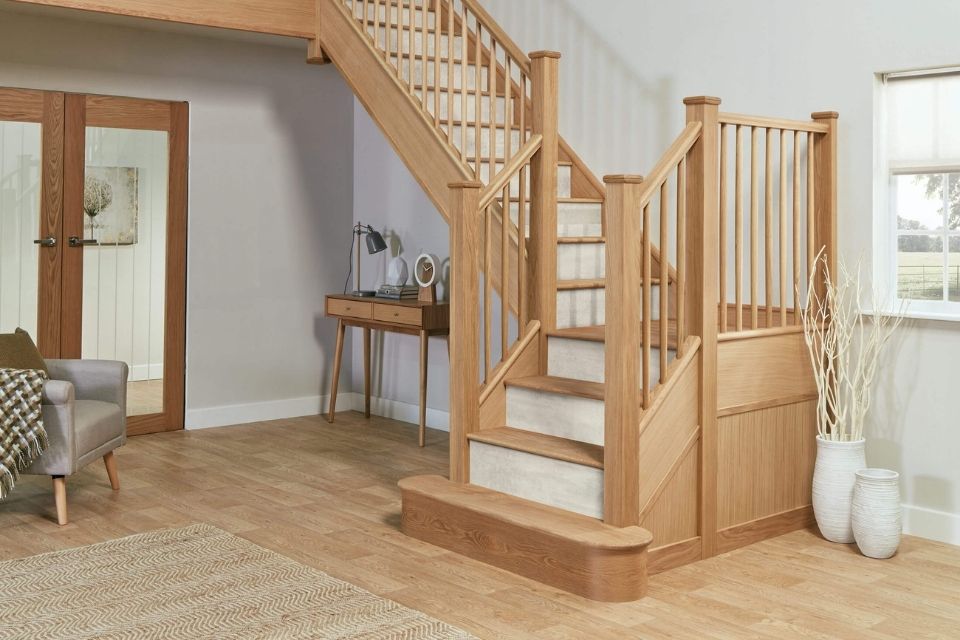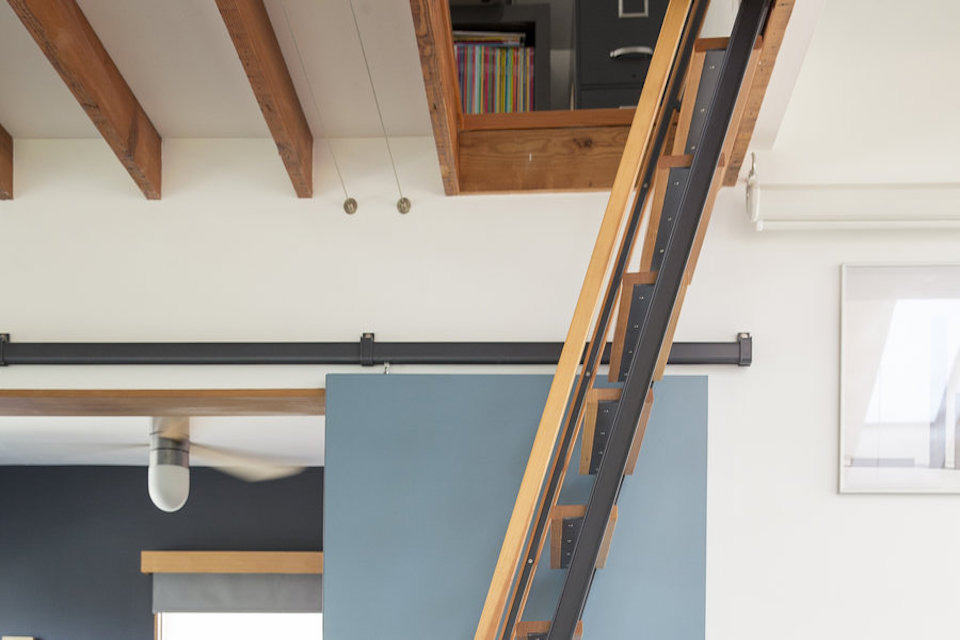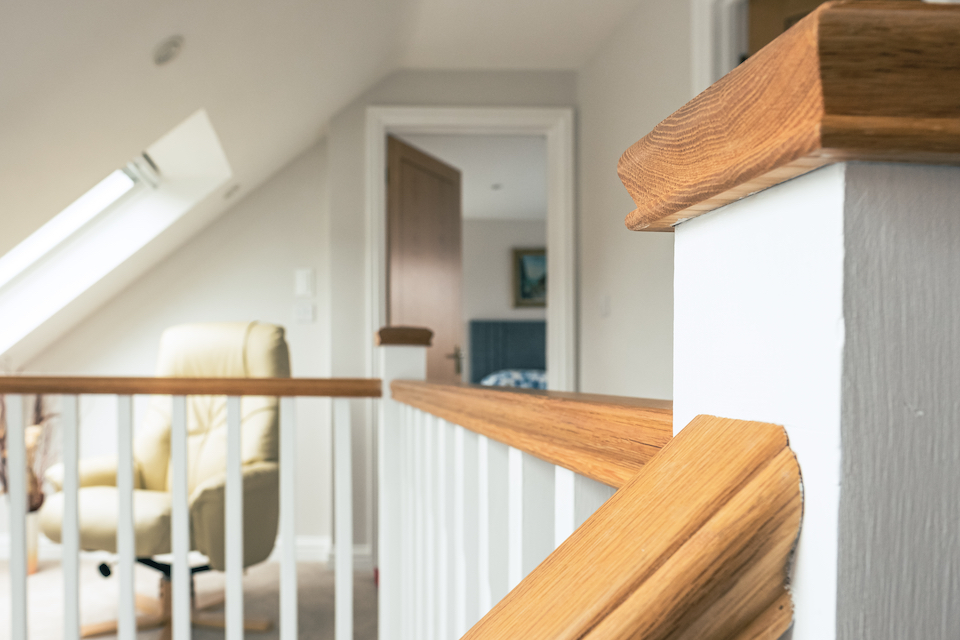How Much Does A Carpenter Charge?
Wait! Before we get to that, let's establish what a carpenter actually does...
In the most basic terms, carpenters and joiners put together and install wooden structures and fittings
They are also highly skilled at repairing existing wooden fittings and furniture.
The average cost for hiring a carpenter or joiner in the UK is around £20-£40 per hour. The joiner costs and carpenter costs tend to be around the same amount.
Carpenters and joiners cut, shape, fit and assemble wood to make various items, using a variety of professional tools.
Bear in mind these additional cost factors...
Those based in the London area can expect to pay more for this type of work than those based in the North or other parts of the UK.
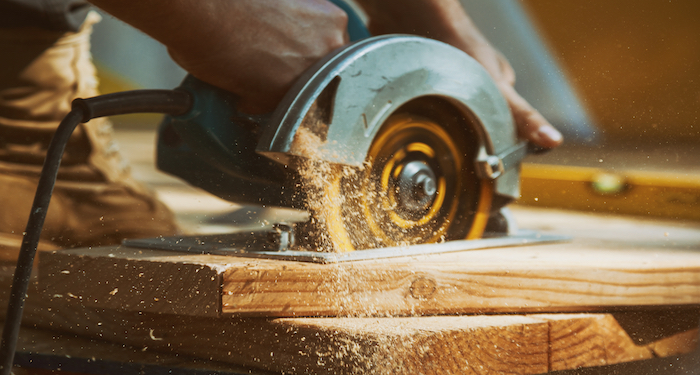
Carpenter Prices
For a better idea of the joiner prices or carpenter prices you can expect, we have created the table below that highlights the various prices for different jobs:
| JOB DESCRIPTION | AVERAGE COST |
|---|---|
| Refinishing furniture | £20-£30 per hour |
| Repairing a cabinet | £20-£25 per hour |
| General carpentry | £20-£30 per hour |
| Fine woodworking | £30-£40 per hour |
| Build a fitted wardrobe | £750-£1250 |
| Supply and fit skirting board | £225-£300 per room |
| Hang a new set of doors | £320-£800 |
| Install garden decking | £450-£1000 |
| Laminate install | £15-£25 per square metre |
| Engineered wood install | £20-£30 per square metre |
| Natural wood install | £30-£40 per square metre |
| Herringbone pattern install | £60-£80 per square metre |
| Design and create a wooden chair | £250-£400 |
| Design and install shelves in an alcove | £200-£300 |
| Build small bespoke furniture piece | £300-£500 |
| Build large bespoke furniture piece | £600-£1000 |
| Put together flat-pack furniture | £80-£120 |
| Lay flat prepared flooring in an average-sized room | £200-£400 |
What are the Supply Costs of Carpenter Jobs?
If you are planning on doing some woodwork yourself, then you may be interested in the cost of the supplies for doing carpentry or joinery jobs. When it comes to this type of work, there are a lot of different tools required depending on the job.
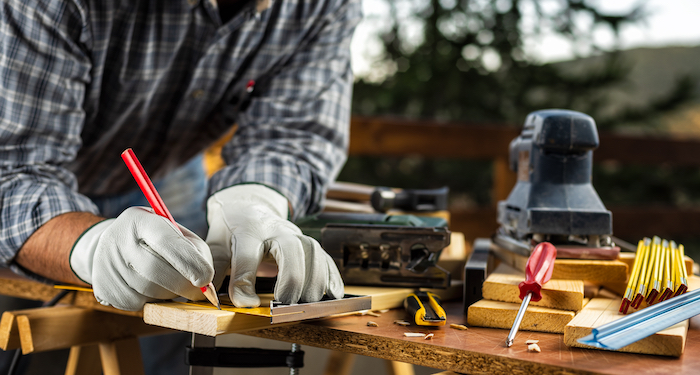
Below is a table showing the various tools that you may need for carpentry or joinery work and their average costs:
| TYPE OF SUPPLIES | AVERAGE COSTS |
|---|---|
| Tape measure and square | £10-£50 |
| Circular saw | £50-£150 |
| Jigsaw | £40-£120 |
| Hand saw | £20-£80 |
| Plane or sander | £20-£60 |
| Hammer | £8-£40 |
| Mallet | £12-£50 |
| Power drill | £50-£150 |
| Screw gun | £100-£200 |
| Woodworking bench | £100-£400 |
| Safety equipment | £50-£120 |
| Pack of 1500 multi-sized nails | £12-£20 |
| Pack of 800 assorted screws | £12-£20 |
| Wood glue | £10-£15 |
You will also need to consider the costs of the wood for the job. This will vary depending on the type of wood that you choose, the quality of the wood, and where you purchase the wood from. If you are completing a large project, you can save some money by buying your wood at wholesale prices.
What are the Additional Costs of Joiner Jobs?
There are several additional costs that you may need to consider when it comes to joinery or carpentry jobs. Below is a list of the additional things that you may need to budget for with this type of work:
Minimum Fee
When hiring a carpenter or joiner to complete work for you, they will usually charge a minimum fee for the work. After this initial fee, most carpenters or joiners will then charge hourly fees or daily fees depending on how big the job is.
Number of Tradespeople
The number of tradespeople can affect the overall cost that you will pay for joinery or carpentry work. If the job at hand is quite large, then you may need to hire more than one tradesperson to complete the work for you.
The more tradespeople that are working on the job, the more you can expect to pay for the work.
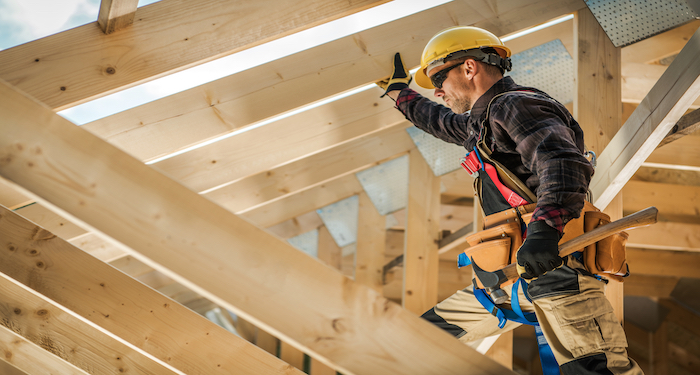
Additional Time
As with all jobs, there are some things that may go wrong, and this will result in additional time being added to the job. The longer the job takes to complete, the more you can expect to pay overall for the work. Additional time is usually charged at an hourly rate.
Tradesmen Costs for Carpenter Jobs
If you are purchasing your materials separately, then you may need to know how much it may cost to pay the tradesperson or tradespeople alone. In this section, we will take a look at the costs that you can expect to pay a joiner or carpenter to complete woodwork for you.
Carpenter and joiner prices can vary depending on the type of job and your location.
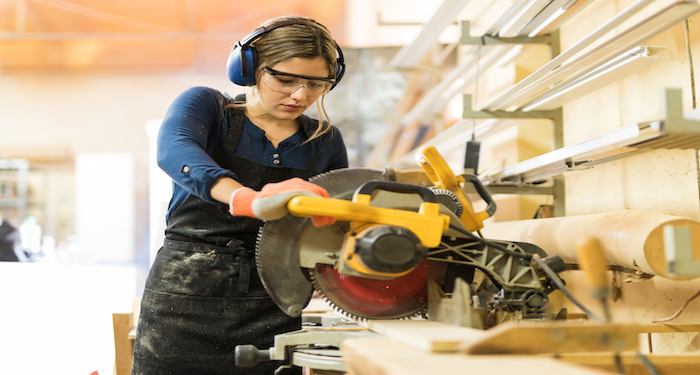
The average cost for hiring a carpenter or joiner in the UK is around £20-£40 per hour per contractor. Those based in the London area can expect to pay more for this type of work than those based in the North or other parts of the UK.
Some tradespeople may charge a daily rate if you are getting a lot of work done. If you are paying a joiner or carpenter a daily rate, then you can expect them to charge around £150-£250 per day per contractor.
How Long Do Joiner Jobs Take?
If you are getting some carpentry or joinery work done, then you may be interested in how long the job might take. Below is a table showing the timescales that you can expect for various jobs:
| JOB DESCRIPTION | DURATION |
|---|---|
| Refinishing furniture | 1-3 days |
| Repairing a cabinet | 2-6 hours |
| Fine woodworking | 2-14 days |
| Build a fitted wardrobe | 2-4 hours |
| Fit skirting board in one room | 1-2 days |
| Hang a door | 1-2 hours |
| Install garden decking | 1-2 days |
| Create a wooden chair | 1-2 weeks |
| Install shelves in an alcove | 4-8 hours |
| Build small bespoke furniture piece | 1-3 weeks |
| Build large bespoke furniture piece | 3-6 weeks |
| Put together flat-pack furniture | 1-3 hours |
| Lay flat prepared flooring in an average-sized room | 3-6 hours |
Types of Joiner Jobs
Carpentry and joinery work is quite vast and involves many different job types. Below is a list of the different fields of carpentry and joinery work:
Rough Carpentry
Rough carpentry involves work in planning, building, and maintaining structures of buildings. This can involve work in constructing framing, roofing, or wooden structures that are used when building houses.

Rough carpentry doesn’t usually require any polished finishes. This is one of the most common fields of carpentry.
Joist Work
Joiners construct floor joists for floor surfaces. Similar to rough carpentry, this type of carpentry doesn’t require any detailed work. This work is more about structural integrity and durability.
Installing flooring is an additional part of this work. When installing flooring, the contractor will need the skills to create a polished finish.
Trim Carpentry
Trim carpenters specialise in building mouldings and trims for a room. This type of carpentry work is a specialised type of carpentry that may require specific materials or specific uses of materials.
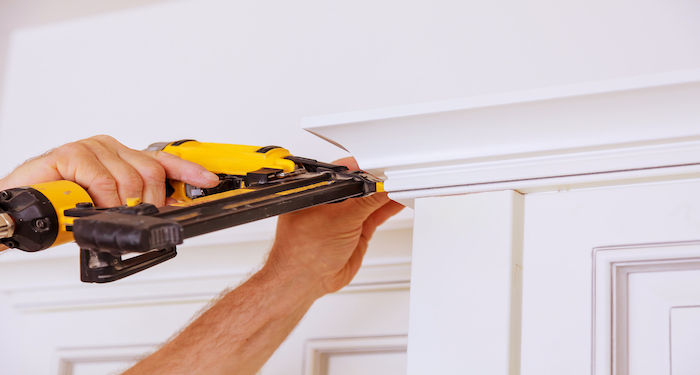
Trim carpenters may be responsible for building and installing mantles, architraves, skirting boards, or other similar structures.
Cabinet Carpentry
Cabinet makers specialise in a type of carpentry that focuses on building cabinets. This can be cabinets for laundry rooms, bathrooms, kitchens, or other areas of the home.
Cabinet carpentry may also involve other types of woodworking, such as building patio furniture or building indoor furniture sets.
Framing Work
Framing work involves building framing for houses and other buildings. The difference between a frame carpenter and a rough working carpenter is that a framer specialises in only the framework, and these jobs tend to be smaller and faster to complete.
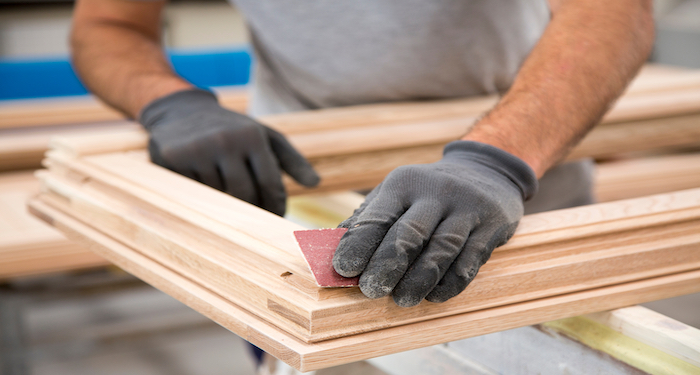
Roofing Work
A roofer specialises in planning, building, and maintaining all of the rafters, beams, and trusses that are needed to construct a roof.
This type of carpentry work is important because it ensures that the roof is structurally sound both inside and out. It is also there to ensure that the roof remains durable.
Flooring Work
Some carpenters or joiners will specialise in installing flooring. This can involve a range of different flooring types and can also include bespoke flooring.
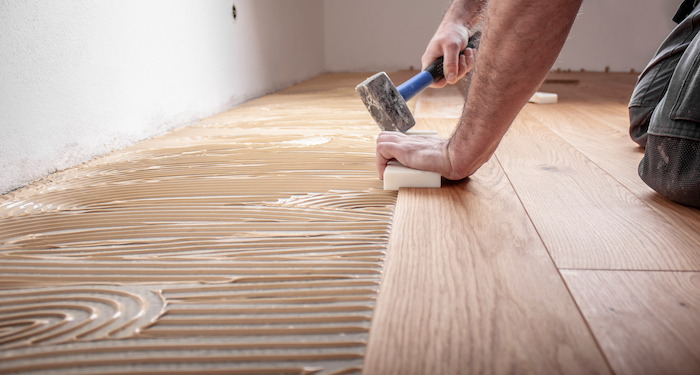
A carpenter will usually design and create flooring for you according to your needs. However, sometimes you can hire a carpenter or joiner to simply lay ready-made flooring for you.
Door Installers
Some carpenters or joiners may specialise in creating and installing doors. This may include both internal doors and external doors.
You can hire a carpenter or joiner to create a bespoke door for you and install it, or you can hire them to simply install a ready-made door for you.
FAQs
Q: What is the difference between a carpenter and a joiner?
A: Carpentry and joinery are both construction trades. Joiners join wood in a workshop, whereas carpenters construct the building elements of a house or other building. Below are some examples of joiner work and carpentry work to give you a better idea of the differences between the two trades:
Joiner
- Making doors
- Making window frames
- Creating fitted furniture
- Building stairs
Carpenter
- Fitting staircases
- Fitting flooring
- Installing cupboards
- Installing shelving
- Fixing window frames
Q: What qualification does a carpenter need?
A: There are no specific carpenter qualifications or joiner qualifications needed. However, an employer will expect some on-site carpentry experience.
If you are hiring a carpenter or a joiner, then you should always check to make sure they have the relevant skills and experience needed to complete the work that you need. It’s a good idea to ask for photos of previous work to ensure the contractor has the relevant skills.
Many carpenters will also provide carpenter or joiner insurance for your peace of mind.
Q: Why should I hire a professional carpenter or joiner?
A: Hiring a professional carpenter or joiner can be beneficial for many reasons. Their expertise means that you can get the best results for what you need. The work will also usually take much less time to complete.
Professionals will also take care of waste removal for you, so you don’t need to worry about clearing up. This can take a lot of stress out of your new installation.
Q: What skills are needed to be a carpenter?
A: There are a number of essential skills that are needed to be a successful carpenter. One of the most important ones is attention to detail. A carpenter will also be required to know what tools to use for each part of the job.
Some simple maths skills are required to work out precise measurements. A carpenter or joiner should also be in very good health as it can be very physically demanding work.
Q: How much does it cost to replace my front door?
A: If you are planning on hiring a carpenter or joiner to install a new front door for you, then you may be interested in the costs involved with this type of work.
The average cost for a new front door is around £500-£2500 depending on the materials used and your location in the UK.
If you are planning on having a bespoke door installed, then this could cost up to around £4000, depending on the design and the choice of materials.
Q: Can I paint my kitchen cupboards?
A: Yes, you can. If you notice your cupboards are becoming scratched or if your kitchen cupboards are becoming dull, then you should consider painting them.
For wooden cupboards, you should use satinwood paint that has a quick-drying formula so that the wood remains protected and enhanced.
To hide scratches on your kitchen cupboards, you may want to consider matte paint as this can help to cover imperfections. High-gloss paints are not the best for hiding damage.
However, these paints work well on cupboards with faded paint as they can easily be applied over the top to improve the appearance and make it more durable.
Sources
- https://woodworkhubby.com/the-real-cost-of-starting-your-woodwork-hobby
- https://www.indeed.com/career-advice/finding-a-job/types-of-carpentry
- https://www.internationaltimber.com/resources/whats-the-difference-between-a-carpenter-and-a-joiner
- https://www.randstad.co.uk/career-advice/career-options/how-to-become-a-carpenter
- https://www.leicestercarpentry.co.uk/news/common-questions-about-carpentry-answered




